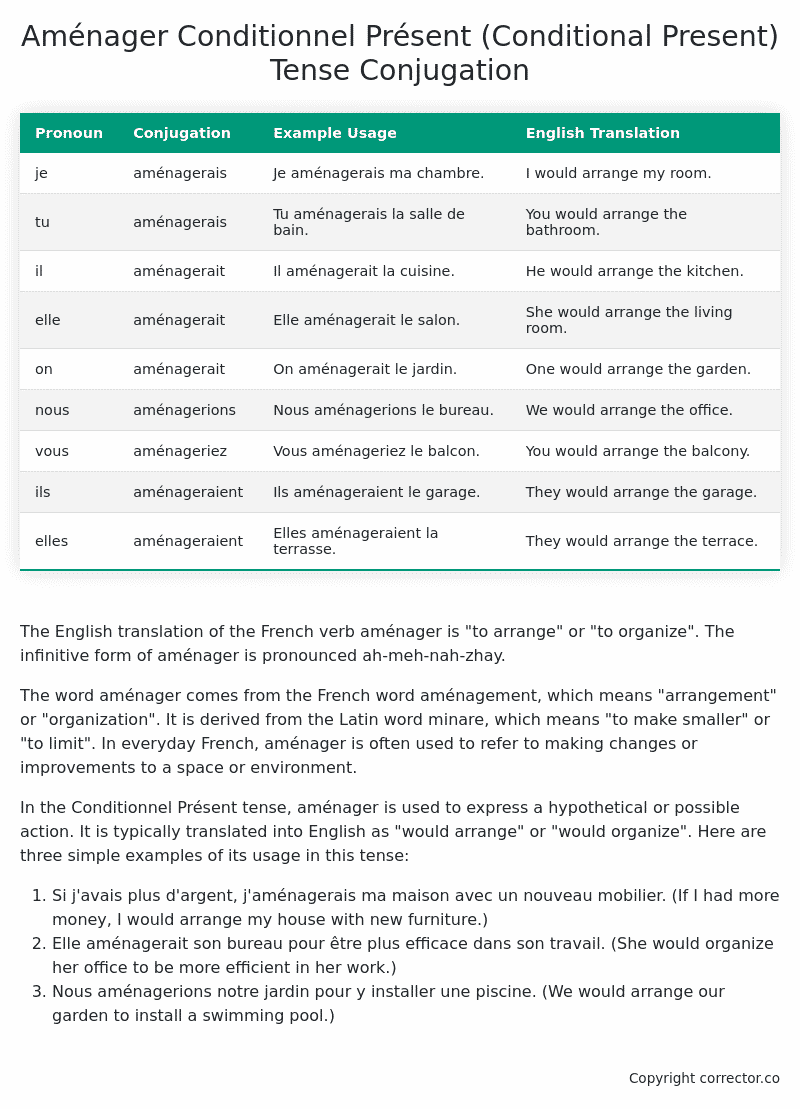Conditionnel Présent (Conditional Present) Tense Conjugation of the French Verb aménager
Introduction to the verb aménager
The English translation of the French verb aménager is “to arrange” or “to organize”. The infinitive form of aménager is pronounced ah-meh-nah-zhay.
The word aménager comes from the French word aménagement, which means “arrangement” or “organization”. It is derived from the Latin word minare, which means “to make smaller” or “to limit”. In everyday French, aménager is often used to refer to making changes or improvements to a space or environment.
In the Conditionnel Présent tense, aménager is used to express a hypothetical or possible action. It is typically translated into English as “would arrange” or “would organize”. Here are three simple examples of its usage in this tense:
- Si j’avais plus d’argent, j’aménagerais ma maison avec un nouveau mobilier. (If I had more money, I would arrange my house with new furniture.)
- Elle aménagerait son bureau pour être plus efficace dans son travail. (She would organize her office to be more efficient in her work.)
- Nous aménagerions notre jardin pour y installer une piscine. (We would arrange our garden to install a swimming pool.)
Table of the Conditionnel Présent (Conditional Present) Tense Conjugation of aménager
| Pronoun | Conjugation | Example Usage | English Translation |
|---|---|---|---|
| je | aménagerais | Je aménagerais ma chambre. | I would arrange my room. |
| tu | aménagerais | Tu aménagerais la salle de bain. | You would arrange the bathroom. |
| il | aménagerait | Il aménagerait la cuisine. | He would arrange the kitchen. |
| elle | aménagerait | Elle aménagerait le salon. | She would arrange the living room. |
| on | aménagerait | On aménagerait le jardin. | One would arrange the garden. |
| nous | aménagerions | Nous aménagerions le bureau. | We would arrange the office. |
| vous | aménageriez | Vous aménageriez le balcon. | You would arrange the balcony. |
| ils | aménageraient | Ils aménageraient le garage. | They would arrange the garage. |
| elles | aménageraient | Elles aménageraient la terrasse. | They would arrange the terrace. |
Other Conjugations for Aménager.
Le Present (Present Tense) Conjugation of the French Verb aménager
Imparfait (Imperfect) Tense Conjugation of the French Verb aménager
Passé Simple (Simple Past) Tense Conjugation of the French Verb aménager
Passé Composé (Present Perfect) Tense Conjugation of the French Verb aménager
Futur Simple (Simple Future) Tense Conjugation of the French Verb aménager
Futur Proche (Near Future) Tense Conjugation of the French Verb aménager
Plus-que-parfait (Pluperfect) Tense Conjugation of the French Verb aménager
Passé Antérieur (Past Anterior) Tense Conjugation of the French Verb aménager
Futur Antérieur (Future Anterior) Tense Conjugation of the French Verb aménager
Subjonctif Présent (Subjunctive Present) Tense Conjugation of the French Verb aménager
Subjonctif Passé (Subjunctive Past) Tense Conjugation of the French Verb aménager
Subjonctif Imparfait (Subjunctive Imperfect) Tense Conjugation of the French Verb aménager
Subjonctif Plus-que-parfait (Subjunctive Pluperfect) Tense Conjugation of the French Verb aménager
Conditionnel Présent (Conditional Present) Tense Conjugation of the French Verb aménager (this article)
Conditionnel Passé (Conditional Past) Tense Conjugation of the French Verb aménager
L’impératif Présent (Imperative Present) Tense Conjugation of the French Verb aménager
L’infinitif Présent (Infinitive Present) Tense Conjugation of the French Verb aménager
Struggling with French verbs or the language in general? Why not use our free French Grammar Checker – no registration required!
Get a FREE Download Study Sheet of this Conjugation 🔥
Simply right click the image below, click “save image” and get your free reference for the aménager Conditionnel Présent tense conjugation!

Aménager – About the French Conditionnel Présent (Conditional Present) Tense
Formation
Common Everyday Usage Patterns
Expressing Polite Requests
Expressing Hypothetical Situations
Expressing Doubt or Uncertainty
Interactions with Other Tenses
Present Tense
Past Tense
Future Tense
Conditional Perfect
Summary
Want More?
I hope you enjoyed this article on the verb aménager. Still in a learning mood? Check out another TOTALLY random French verb conjugation!


